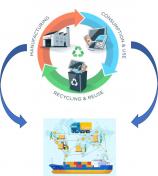
Theme
Promoting Circularity in Transition Economies: The Role of Trade and Economic Cooperation - Side Event of World Circular Economy Forum Online
Organized by UNECE in partnership with the Geneva Trade Platform (Russian interpretation provided)
Date and Time
8 December 2020 from 12:00-13:30 CET
Recording of the event News item
Background
The circular economy topic is emerging as a new economic paradigm in support of sustainable and resilient growth. In acknowledgement of its significance, UNECE member States determined circular economy and the sustainable use of natural resources as the cross-cutting theme oftheir high-level biannual gathering, the 69th Session of the Commission, scheduled for April 2021.
With several developed economies at the forefront of global policy developments, the objective of a gradual transition to a more circular economy is now also being embraced in other parts of the world. Still, despite encouraging policy progress, insufficient attention has been afforded to the circular economy pathways of transition economies. This session showcases examples of such progress in some of the UNECE’s 17 programme countries (Albania, Armenia, Azerbaijan, Belarus, Bosnia and Herzegovina, Croatia, Georgia, Kazakhstan, Kyrgyzstan, Republic of Moldova, Montenegro, Serbia, Tajikistan, Turkmenistan, North Macedonia, Ukraine, and Uzbekistan) in Central Asia, Southern Caucasus and the Western Balkans:
- Georgia: recognizing the importance of a gradual move to a circular economy, Georgia initiated the development of a circular economy strategy and took some important steps to include, for example, the introduction of the Extended Producer Responsibility (EPR) in its national Waste Management Code.
- Kazakhstan: Almaty is the first city in Central Asia which carried out a circular economy opportunity analysis. The resulting report proposes various options for moving towards circularity in the city’s agriculture and food processing sectors, construction, and other industries. This first step towards circularity has provided an initial basis for Kazakhstan to strengthen international cooperation and foster a dialogue between all stakeholders to achieve the principles of sustainable development.
- North Macedonia: while North Macedonia is yet to develop a circular economy strategy, the country has taken important strides in improving its environmental performance in several areas, including reducing its dependence on fossil fuels to generate electricity in favour of renewables, and strengthening waste and chemicals management.
- Serbia: Serbia is one of the first countries in the Western Balkans to have produced a Roadmap for Circular Economy. The purpose of the Roadmap is to encourage production through the application of circular business models, to motivate industry to create new work posts and to advance doing business by identifying innovative, sustainable solutions on the market.
Considering such developments in the UNECE region and recognizing the importance of fostering an inclusive circular economy, this session will explore circular economy opportunities arising from value chains, trade and trade facilitation in transition economies. By bringing together representatives of four transition economies, the session will present an opportunity to exchange perspectives on the various angles of circularity.
Target Audience
- Global environment community
- Academia
- Government representatives
- Development partners
- Private sector
Format
- An interactive online dialogue between transition economies preceded by a formal opening session with remarks from the Executive Secretary of UNECE and the Minister of Economy of North Macedonia
- Simultaneous Russian interpretation with a view to reaching audience in capitals
Moderator
- Ms. Elisabeth Tuerk, Director, Economic Cooperation and Trade, UNECE
High-level opening segment
- Ms. Olga Algayerova, UN Under-Secretary-General, Executive Secretary, UNECE
- H.E. Mr. Kreshnik Bekteshi, Minister of Economy, North Macedonia
- H.E. Ms. Nino Tandilashvili, Deputy Minister of Environment Protection and Agriculture, Georgia
Experience-sharing segment
- Speaker 1: Mr. Olzhas Sartaev, CEO of Special Economic Zone "Park of Innovative Technologies" in Almaty, Kazakhstan
- Speaker 2: Ms. Aleksandra Vucinic, Head of Group for Circular and Green Economy, Ministry of Environmental Protection, Serbia
- Discussant: Ms. Marianne Kettunen, Head of Programme, Institute for European Environmental Policy (IEEP)
Open discussion with the audience
- Q&A

